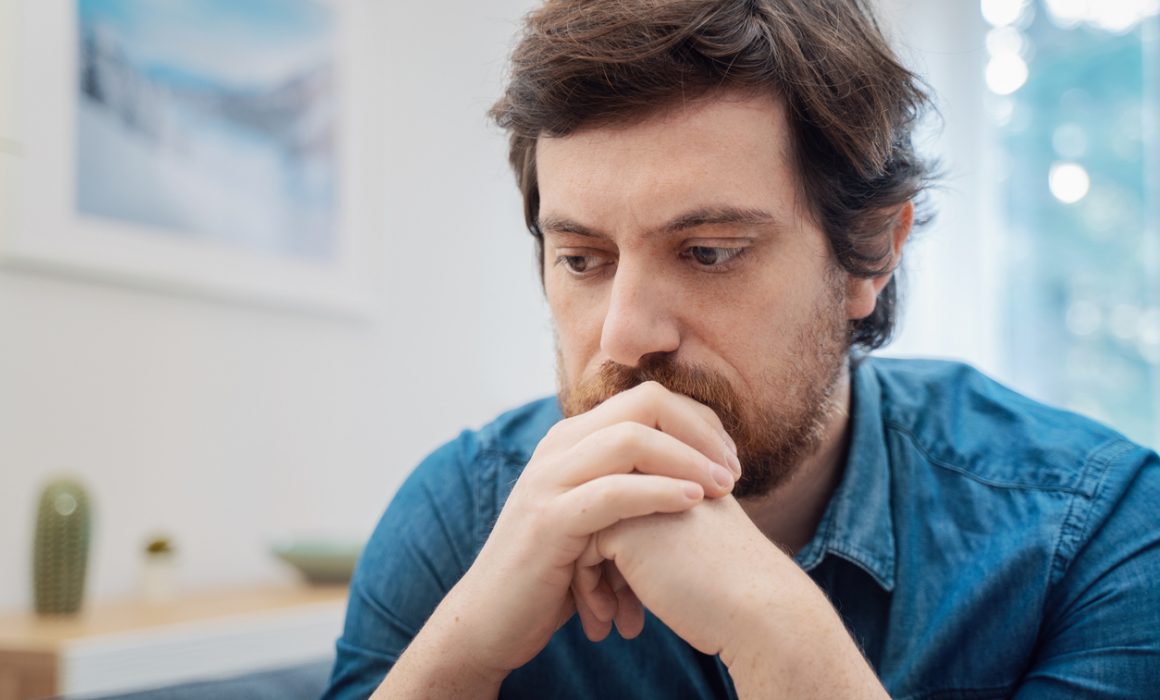Signs of Anxiety, Stress, and Depression in Men
May is the National Mental Health Awareness Month in the United States. One of our founders, Max, recently talked about his observation on how men often found it difficult to speak up about their inner world. He recommended this article that talks about signs of anxiety, stress, and depression in men by Jean Claude Chalmet, as told to Anna Maxted. A version of this article can be found on ThePlaceRetreat.com.
Your job has become your entire identity

Midlife is the time for a reality check for most men. Your mortality comes into focus. You realize that some of your dreams may be over. Even if men succeed in their fantasy of, say, making money and attaining power, they may realize that they’re still not happy.
The question underneath all of this that very few men ask themselves is: who am I really? Who do I want to be?
Last year in particular we were forced to hold up a mirror to our lives. But even without a pandemic, if a man gets to 40 or 50 and realises that he hates his job, leaves it, or loses it, this can lead to a mental crisis. So much of male identity and status are linked to job and earnings, or worse, enmeshed with it.
Shake that foundation and you shake the core of the man. Especially if this is how he has lived for 30 years.
There’s a shift in how he sees himself and how he’s perceived by his partner, family and friends. Many men think: “What am I good for?”
Not only that, men are conditioned to be problem-solvers, so if a situation creates work issues over which they have no authority or control it can feel devastating.
Many men who have lost their jobs tell me in clinic: “My entire structure for managing life has been taken away.”
Often they have a family, a mortgage and feel trapped or desperate. The question then for a man to ask himself is: are the ways in which I cope with stress helping me or making it worse? How do I manage pressure and stress? It’s a chance to reassess.
Some men won’t talk to their partner, or anyone, because sadly it has been drummed into them that showing vulnerability is weak, and men can’t be seen to be weak.
In reality, having the courage to be honest about how you feel and seek help shows strength and emotional maturity. Thankfully it has become more acceptable and normal for men to seek help, be that through men’s groups or therapy. Indeed, 75 percent of my clients are men.
You’ve neglected your relationship

Midlife is a time when relationships are often put on the backburner — there are promotions to chase, elderly parents to tend to, children to worry about and me-time to carve out. You’re so busy putting out fires that if there is already very little being put into the relationship, it doesn’t take much for it to become a barren desert. All conversation becomes operational.
There are no deep, intimate talks, and sex is rare and perfunctory. You both feel underappreciated.
By midlife many men have built a superficially perfect life, moving easily from office to cricket to gym to pub, and in those circumstances even a marriage that needs work is bearable. No wonder last year put every marriage under a microscope, revealing every flaw.
Many men, trained to be solution-focused, switch to project manager mode in a crisis: “No time for emotion, I know what needs to be done.” But no one in a romantic bond wants to feel managed.
Summon the courage to explain how you feel. But also ask if you have the care, courtesy and compassion to listen to your partner without getting defensive, tetchy and wanting to talk about yourself.
Say: “Let’s have a chat about us. I’d like to hear how this has been for you, I’d like to say how it’s been for me.” Men, if you want to be problem-solvers, solve this. Not by saying what to do or giving advice, but by listening — just as you want to be heard too.
You feel lonely, despite your partner and kids

Feeling lonely is one of the hardest things for men to admit. When I mention it in my practice the standard reply is: “How can I feel lonely? I’ve got a wife, kids, dog, cat.” I say: “Do you feel united as a couple?” The response is: “Well I wouldn’t be here if I was.”
When I ask about their relationship with the children, they say: “They have their own lives, they never want to talk.” Then I say: “And you’re telling me you’re not lonely?” Oh I see. Most men think they have to be alone — divorced, single or bereaved — to feel alone. But more men are lonely in their relationships.
I also believe that a lot of couples go wrong when men become successful in their careers, women stay at home to raise the children or are substantially lower earners and the men begin to feel that they are a cut above because the women are not as “successful” as they are. She becomes the mother of his children rather than a partner.
Escaping this loneliness is about reconnecting with yourself. You may know how to use a cigar cutter and know a lot about wine — but who are you? Our partners and children want an authentic person.
Men can feel taken for granted of course. But how you set your value is how you will be treated. If you want to be valued emotionally and physically then give affection, show interest. Some successful men lose the ability to feel and to see how they make other people feel. Their only currency is giving, spoiling, buying love — an imitation of feeling.
If you don’t have ten minutes to spend with your children or partner, no wonder you’re lonely. Just being there is one of the most beautiful gifts we can give — although make it interesting, you’re not doing them a favour. Be there, show interest and the loneliness will leave you.
You’re feeling a new sense of loss

We all know how difficult it is to let go and midlife is for many men the first time they have felt profound loss, be that bereavement, feeling creakier, fatter, less physically robust or the shock of redundancy or divorce.
We must accept that it’s OK not to be OK. If you are experiencing low mood but it’s not critical, your first line of defence is to look after yourself. When you can, walk, play football, go out, go to the gym, create endorphins.
Depression is acute when you no longer find pleasure in life, family or work. You feel apathetic, indifferent, despondent, bleak until you can’t get out of bed. Pills create a buffer zone between the treadmill and our feelings so we can keep running. Pills can be lifesaving but not in isolation.
The greatest barrier to contentment and peace, which afflicts many intelligent men, is that they reach midlife yet their emotional maturity — emotional awareness, emotional self-regulation, the ability to self-motivate, delay gratification and communicate effectively — remains stunted.
Men who aren’t taught these skills in childhood may find a partner who helps them, or if they’re sensitive and intuitive enough they help themselves. But many don’t and it matters because if you are emotionally inarticulate you can’t understand why and how you feel so bad and it impedes your relationship with those you love.
It also means that a lot of men know that something is wrong but don’t know what to do because they’re so fearful that they will be seen as whiners, incapable or not manly if they seek help because real men don’t cry — nonsense.
Emotional maturity is developed through sharing and practice. If you don’t have a partner or friend you can confide in, you might join a men’s group where others are going through similar experiences and they understand. The most powerful words when you’re in distress are “me too”.
You’re drinking too much

Why does so much socializing in the UK (note: Jean Claude Chalmet is British) involve so much drinking? It’s an unspoken shared secret — we all have problems, let’s drink and talk drivel to forget them.
No one needs to escape contentment. A drinking habit shows that you are emotionally incapable of looking after yourself. And it’s often to alleviate loneliness (men’s midlife mental health issues interlink like a fine Swiss watch). We drink to escape emotional pain, be it from childhood or last week. Facing the truth can be painful but it’s the only way to free ourselves from its hold and stop our past controlling our present. Seek professional help the moment you feel out of your depth.
Men need to be less hard on themselves too — and if you are harsh on yourself, consider where you learned such cruel behavior. We live in isolated pods as men. We pretend we don’t. But it’s surprisingly rare that we have people with whom we can discuss our problems. Talk to someone who can help. Men deserve tenderness.
From Everything To Sea:
New experiences, including exotic travel, can help a person get out of a rut. An Everything To Sea experience – relaxed sailing on the sea, with sunshine, space, fresh air, and friendly guys – can be one step to helping men along on the path to healing. Regardless of what action a man chooses, alleviating anxiety, stress, and depression is essential to having a happy and healthy life.


Great read. Every guy, young and old should read this.
Ed